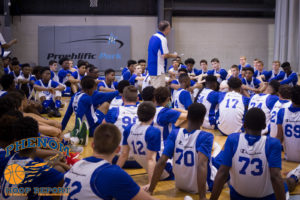If you ask any young prospect playing basketball, where he would like to play in college, the general response will be, “at the highest level.” Every young player has his or her sights on and dreams of playing D1 basketball. The facts are that there are a limited number of scholarships available and a high number of players worthy of playing at that level. In the 2015-16 season, there were 351 D1 schools with the average number of scholarship per year at approximately three. This means there are approximately 1053 D1 scholarships to give out every year.
 According to www.collegesportsscholarships.com there are an estimated 546,335 students playing high school basketball, and in any given year, there are 156,096 seniors fighting for college scholarships. This means only .007% of graduating seniors will have an opportunity to play D1 basketball. To further complicate the issue, the vast majority of players hope to play at a higher competitive level than is realistic or appropriate, given their skill level. While it is an ego-based attitude that drives this mindset, most players and parents have it all wrong. We understand the idea of making it big, having the opportunity to play on the big stage, and then get drafted by the NBA, but the chances are less than .00017% that a college basketball player will even be drafted.
According to www.collegesportsscholarships.com there are an estimated 546,335 students playing high school basketball, and in any given year, there are 156,096 seniors fighting for college scholarships. This means only .007% of graduating seniors will have an opportunity to play D1 basketball. To further complicate the issue, the vast majority of players hope to play at a higher competitive level than is realistic or appropriate, given their skill level. While it is an ego-based attitude that drives this mindset, most players and parents have it all wrong. We understand the idea of making it big, having the opportunity to play on the big stage, and then get drafted by the NBA, but the chances are less than .00017% that a college basketball player will even be drafted.
The problem is simple: too many people are chasing the dream that they will be in the NBA one day, which is an incredibly difficult journey. For the players that are fortunate to be in the position to have their college education paid for, a different approach and attitude is required.
First of all, all players need to take a step back and ask themselves: What is the best fit both athletically and academically' Where can I attend college and get a degree that will benefit me later on in life'
The four for forty plan
Basketball is just a small journey along the way in the most important game of life. For 95% of the players that are fortunate enough to play at the collegiate level, the ball will stop bouncing once they finish their four years of college. Players should be more interested in obtaining a meaningful degree that will ensure they have a successful job and career for the next forty years of their life. Basketball is a big business, but players need to use the platform of a free education to expand their chances of making an impact in society with a meaningful job and career opportunity. Make no mistake, the opportunity to play collegiately for free for four years is a lifetime savings, but make sure you put those four years to good use. More importantly, the four-year college education should be an equivalent to a forty-year lifetime investment.
Counting offers
While it is great to see a young player receive offers, please remember you can only pick one. Even more importantly, unless you are a high elite level prospect, the shelf life of an offer can be less than a week. In most situations, college coaches put out countless offers to players playing the same position. Sometimes, it’s on a first come/commitment basis, but in many cases they have a list of prospects numbered 1-10 in a priority order. If you really want to know if the offer is legit, just ask them are they willing to accept a commitment on the spot. You may be a little surprised by the response. Players that are eager to state, “I’ve received my 11th offer from ABC University,” usually is something a college coach doesn’t like seeing or reading. We have heard countless times from college coaches, “man, we hate to even offer that kid. Simply because he is counting offers.” There is nothing wrong with putting out the offers on social media, but be careful, very careful of “counting offers.”
Don’t out punt your coverage
To use a football analogy, please be careful about “out punting your coverage.” Time and time again, we have seen players’ get offers from the appropriate level. For example, you may have a player that can be a solid low major D1 prospect and receives an offer from that appropriate level. However, those same players want something “bigger and better.” Only to find out those offers may not be around a month from now.
Use the system
For the players that are fortunate to get a collegiate offer and has a chance to play the game they love, make sure you use the system to benefit you long term. Make the most of your college experience, especially in the classroom. Those four years in the classroom obtaining a meaningful degree will help prepare you for the next forty years of your life. The ball stops bouncing, but the memories last a lifetime. Forty years from now, you really want to be at the highest level in the game of life!